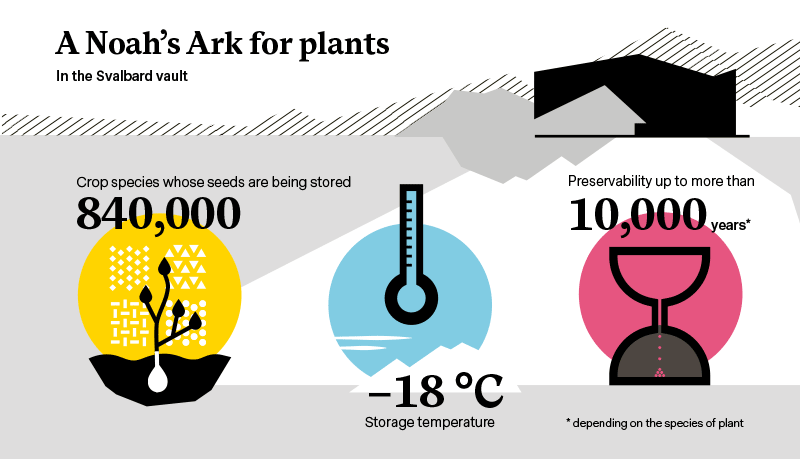A Noah's Ark in the perpetual ice
The loss of biodiversity of edible plants is endangering our food security. That's why the Global Crop Diversity Trust is securing the genome and diversity of the world’s crops. In an emergency, a seed vault on Svalbard could one day save the world.
On the Norwegian archipelago of Svalbard, an area half the size of a football pitch has been carved into the rock. Here, the seeds of 840,000 different crop plants are being warehoused in a vault, behind steel-reinforced doors sealed with compressed air. Vacuum-packed and stored at minus 18 degrees Celsius, the seeds can be preserved, depending on the species, for anywhere from a few decades to more than 10,000 years.
Already one third of the world's growing crops have been stored by the Global Crop Diversity Trust. With ambitious goals: The organization wants to ensure the food security of humanity, support breeders in their efforts to adapt edible plants to climate change, and reduce both poverty and the environmental degradation caused by agriculture.
Marie Haga, CEO of the Global Crop Diversity Trust, spoke with us about this seed vault and the future of crops.
Ms. Haga, what are the biggest challenges regarding the seed vault?
Humanity is not aware of the value of the genetic material of these various crops. The loss of crop diversity is irreversible, like the extinction of the dinosaurs or other animals and plants we have lost. Plants are at the base of the food chain. Without them there is no survival.

What is the biggest threat to agricultural biodiversity in your view?
On the one hand, it’s agriculture with its monocultures. These have throttled regional biodiversity. On the other hand, it’s climate change, which many crops are no longer able to cope with. We must find answers to these issues if we want to feed humanity. Already, it’s becoming increasingly difficult to produce enough food for everyone.
Why do you keep the seeds in the perpetual ice?
In permafrost it’s easier to store the plant seeds at temperatures of minus 18 degrees, so that they remain capable of germinating. The reasons for the location also have to do with the acquisition of the rock terrain, which offers excellent insulation. The region is also geologically stable. And because the vault is located high above sea level, it’s also protected from flooding.
The seed vault itself became a victim of global warming recently. Are the seeds in any danger?
No. In 2016, it was discovered that the permafrost ground around the entrance tunnel had thawed and water was leaking into the vault. Meanwhile this problem has been solved. The vault and its treasures were never in any danger.
Some first attempts are being made to artificially produce meat. If this would work with plants, would the seed vault become superfluous?
In theory, it’s possible to artificially produce plant proteins. Whether this is possible in such large quantities to feed humanity – I doubt it. Farmers would then work in laboratories. I would also have concerns about the environmental impact.
The Global Crop Diversity Trust
This independent international foundation was set up in 2005 with the goal of permanently preserving the biodiversity of cultivated plants, so that they can be of use in research, development and breeding. Switzerland, represented by the Swiss Agency for Development and Cooperation (SDC), was one of the first countries to understand the vision and importance of the Trust and to provide support. Today, the Global Crop Diversity Trust is based in Bonn.
Additional information
Would you like to know more about sustainable agriculture? We would be happy to provide you with further information.
